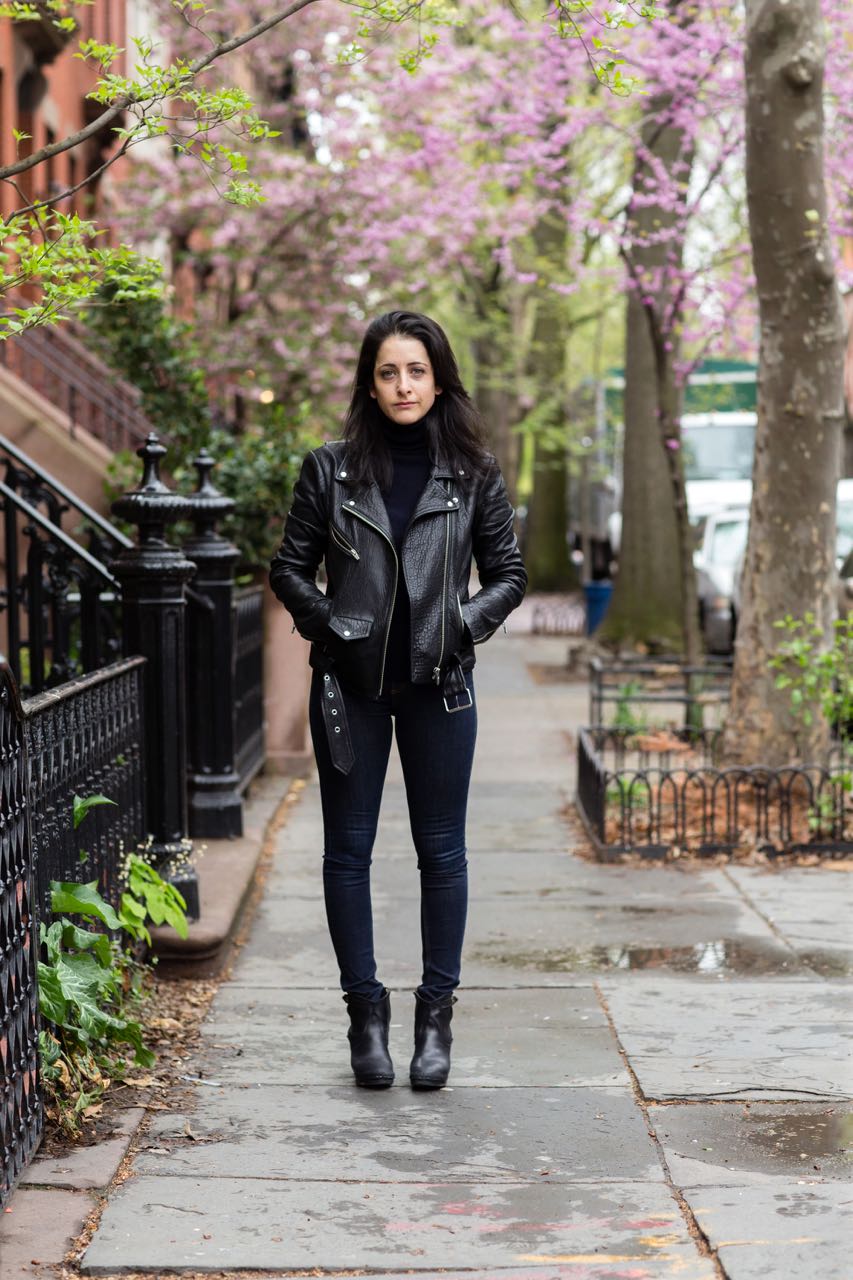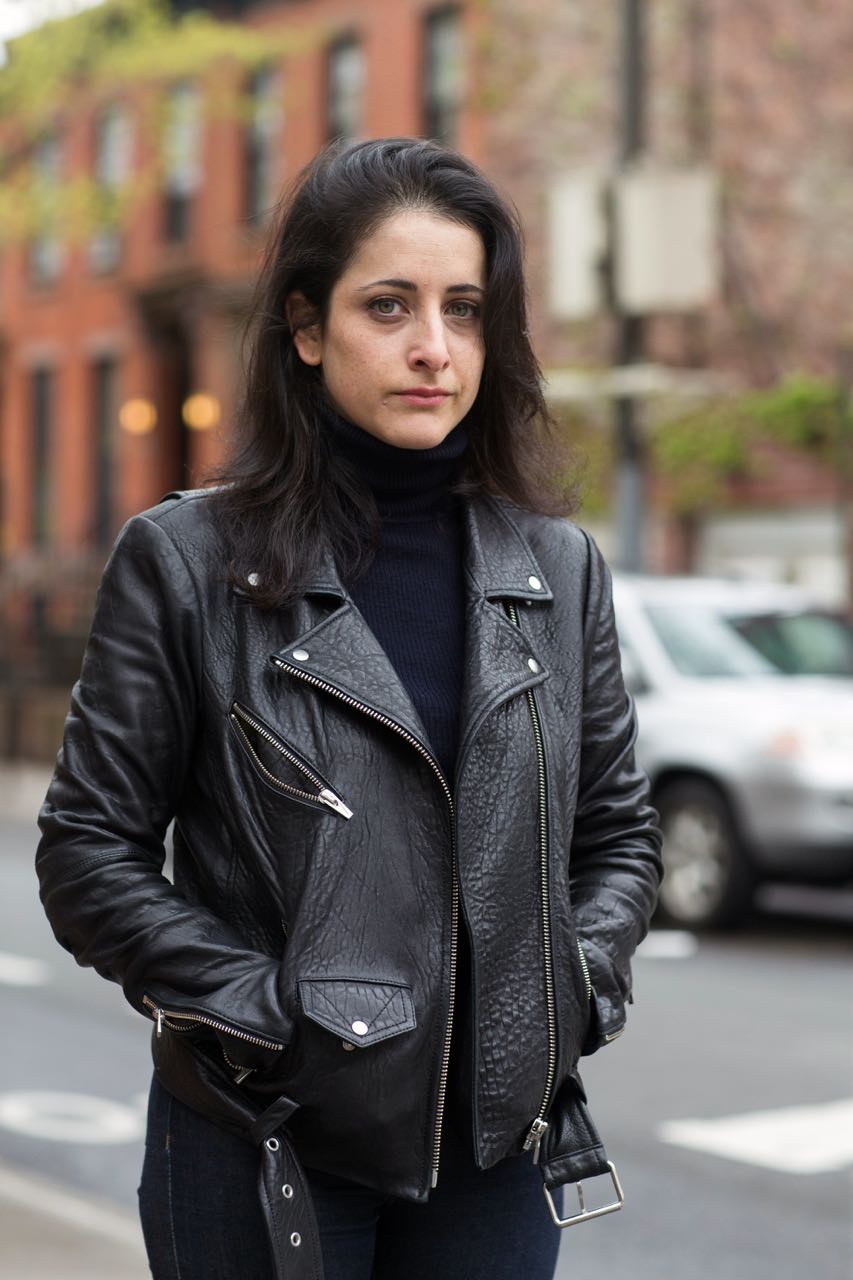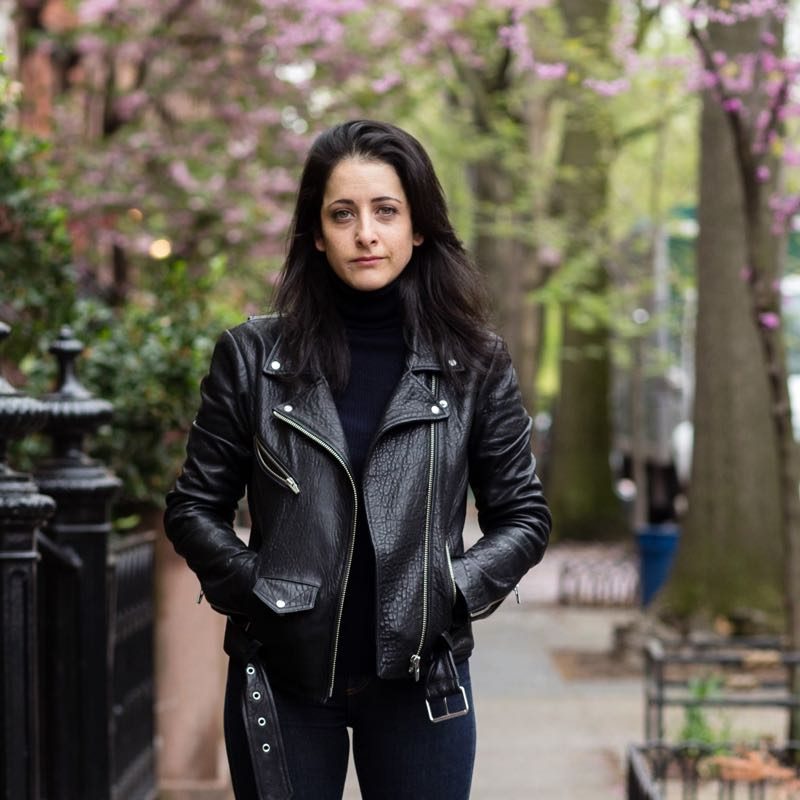An Interview with Lila Neugebauer

Written by Victoria Myers
Photography by Melodie Jeng
May 31st, 2017
A name that popped up a lot in “Who Should Have Been Nominated for a Tony” discussions was director Lila Neugebauer. Lila has yet to make her Broadway debut (making her ineligible for the Tony Awards), but this season saw her directing a variety of critically acclaimed work. Among them was The Wolves, Sarah DeLappe’s play about a high school soccer team; Everybody, a highly stylized play by Branden Jacobs-Jenkins that involved cast members playing different roles every night; and Annie Baker’s The Antipodes, which is currently playing at the Signature Theatre through June 11th. On June 4th, Lila will receive the Sam Norkin Award at the Drama Desk Awards to celebrate her accomplishments this season. Shortly after opening of The Antipodes, a play where the creative team wants the audience to experience the play with as little prior information as possible, we sat down with Lila to discuss her process, her career trajectory, her response to the Presidential election, and more.
When you got the script for The Antipodes, did you feel like you had an immediate reaction of, “I know how to put this on stage, I know what to do with it,” or were you like, “I love it, but I have no idea what to do”?
I didn’t see the script that would become The Antipodes until about ten days before we started rehearsal. In some ways, I feel like this collaboration is an extension of a ten-year long friendship, ongoing conversation, and collaboration with Annie. So, sometime last year, maybe around 18 months ago, Annie asked me if I would direct her new play at Signature. At that point, it did not have a title. I don’t know if there was even a word written. I said yes. Then there were ongoing conversations about what the event might be. Very early on, there was a set of concerns that was on Annie’s mind that was percolating that she was sharing with me. They resonated with me deeply and immediately and powerfully, which made me excited to be thinking about those ideas with her. She also, very early on, had an inkling about how time might operate in this play/production. The very early theoretical premises that were cooking in her brain immediately sparked my creativity; the sense that it would be an enormous challenge full of mysteries and unknowns, that I wouldn’t be able to master in advance. At the same time, I had a kind of intuitive inkling about. Both of those things felt true to me from our earliest conversations.
How did you find that affecting your process? Especially with meeting with designers and all that stuff that usually happens far before rehearsals begin?
It’s an adventure. I also make work with a company. Often in that space, design decisions are made prior to the existence of the script, so it’s not a process that I’m entirely unfamiliar with. In some ways, it’s a new kind of revelation. I think an equally valid process is that a session spent with a set designer looking at research could influence the play; not only be influenced by the play, but could influence the play. There was more of an ongoing conduit between the writing and design process, in a way that fed the play with great richness.
I know that you have directed regional premieres of Annie’s work, and you two have a long relationship. For you as a director, did you find that dealing with a writer who, even though she’s fairly early in her career, there’s been so much written in terms of her style, did that ever feel like an extra thing to navigate in terms of how you bring your own interpretation to something?
I knew Annie before people wrote about her. So I think I’ve been able to form my own opinions and impressions of her sensibility and her concerns through our relationship and our conversations. I also think that her writing is changing. I think that if you look at the trajectory of her plays, there is a kind of fascinating, challenging mystical evolution in her writing. If you look at her play Body Awareness and look at her play John, there’s a pretty radical trajectory charted within that space. That’s to say my conduit to her writing for me feels pretty direct and immediate and operates independently from the way the work is discussed.
Once you were in the rehearsal room and with the actors, what was your process like working with them? Especially with the tone of this play and how it moves.
Tone is something you’re thinking about when you cast a play. In this particular case, Annie writes for specific actors. So a number of these roles were written for the people in the production, or actors participated in developmental legs early enough in the process of the writing that Annie began to write for those actors. I think Annie and I are naturally drawn to actors for her writing who trust a kind of simple, unadorned, incredibly truthful, barebones relationship to language. Something I think I’ve learned about Annie’s writing over the years, from working on different productions of her plays, is that if you’re not actually thinking the thought, the event doesn’t happen. I think in Annie’s case, she’s particularly interested in real-time thinking, living, breathing, speaking, micro moment by micro moment. This production is scored microscopically, vis-a-vis language, gesture, kinesthetic impulse. I thought a lot about the play in a series of cinematic close ups. We found ourselves relying on cinematic vocabulary. I don’t exactly know how that began, but I do think that Annie is putting close-ups on stage. Orchestrating nine bodies in space with hyper-specific precision, detail, rigor, and discipline felt like the project.
Going off of that, did you find that, for you, when you gave notes to the actors, that you had to change how you did that because you need them to do such specific things at such specific moments, but give them a way to do that that is still organic to them?
The kinds of conversations that I find myself having with actors can vary radically from project to project. I don’t know that I’d ever previously talked to actors about the angle at which they turn their heads. I’m not much of a micromanager even though I am aggressively invested in specificity and detail and rigor of moment-to-moment work. I think there’s a distinction between specificity and attention to detail and micromanaging. Early on, there were holistic, organic, “What are we trying to do here” conversations about flow, about production vernacular, about the life of the body on stage in this play, that everybody got on board and was not only game for, but intensely invested in some very technical conversations. There was a healthy oscillating process wherein we were shifting between conversations that pertained to psychology and conversations that pertained to gesture, choreographic vernacular, chair swiveling. We were having different kinds of conversations all the time about the emotional, psychological, spiritual and physical dimensions of the production.
Did that get into conversations about directing the audience into how they should be watching the play, and what in that first five minutes you want to teach them about how to watch this material?
In the first scene of the play, they fill out a sheet with their lunch orders. We were trying to create a production in which a person in power turning the page of a menu could be an event in a room. We all knew that was what we were trying to do—how could we work on people’s conscious and unconscious, subliminally and explicitly, through that kind of focus and care?
What other areas of culture affect your work?
Photography. Music. These days my IV is hooked up to the news—I don’t know what that’s doing to me or my work. Architecture. Sports. For each project, when it’s a new play and a first production, I usually ask the writer what they were reading, looking at, listening to when they were writing the play or dreaming on the play. I try to do my own radical deep dive into their body of source material in order to get closer to the stirrings of their brains when they were creating it.
When you get a project, do you gravitate towards things that you have an immediate impulse about? Or where you don’t, and you’re kind of scared by it, and that’s what makes you gravitate towards it?
I don’t think that I would divide my response quite so cleanly along those lines, which is to say something in it has to speak to me. Something resonates. Something terrifies me. Something is inviting me to reexamine something about the way that I live. Something surprises me profoundly. There’s a hook for me. I find that that hook—whether it’s emotional, aesthetic, intellectual, psychological—often ends up having a relationship to some critical insight that’s going to drive me into the production. At the same time, I’m drawn to material that I don’t immediately know concretely how to put on stage, that I sense is going to contain challenges and terrors that I won’t be able to map out before I’m actually in the thick of it.

I wanted to talk to you about your career and how directors structure their career a little bit. Actors talk all the time about branding and social media and that aspect of the industry. As a director, do you feel there’s a pressure to have a brand?
We probably do, and what a shame. If I have a brand, I don’t know what it is. I’m following what’s interesting to me. That’s in a state of evolution like every other aspect of being a person. I think many creative people are fed by kind of a healthy, robust, diverse ecology of labor and creative pursuits, whether that’s across mediums or simply across subject matter and style. I don’t mean to be Pollyanna-ish. Of course, [typecasting] happens to directors. It happens to all artists. It’s expedient to frame people in certain kinds of boxes. Also, we all have strengths and weaknesses. I don’t think there’s anything wrong with playing to your own strengths or living in your sweet spot. I’m somebody who’s interested in staying nimble and curious. For me, that has involved endeavors that feel somehow new for me or outside of my own comfort zone.
How have you found the process of having agency over your career and making choices of what you want, to do work that is fulfilling and interesting to you? I know you have your own company, so that must help.
By saying yes and no. That sounds flip and concrete, but that’s how. By fostering relationships with the artists I want to work with. This work and this business is all about relationships. To me, it’s about the collaboration with the individual artists first and the project second. To me, this work is about deepening ongoing conversations with collaborators who inspire me and excite me and challenge me. I do make work with the company. I didn’t really set out to do that. In some ways, it was an extension of circumstances. We were a group of people and we made a play together. In order to do that play at a festival, we had to write a company name on a sheet of paper, and so we became a company. Then people kept asking us to make work, and we kept doing it.
Do you feel pressure to capitalize on this particular moment when you have a couple of productions in New York right after each other that are getting a lot of attention?
No. The current political climate and world events have filled me with so many questions about what’s at stake, what we are doing. I just opened a show, so I have that little window of brain space that you can reconnect with when you come out from the tunnel, so, candidly, right now I feel zoomed out. I feel like I’m finding myself reflecting on why I’m working in this form right now. That’s more of what’s on my mind. I mean, I have hunger for the work. I have ambition. I want to keep making plays. I am thinking with great voracious interest and appetite about my upcoming work. That’s what’s on my mind.
Given the election and what’s happening in the world, is what you’re thinking about that you almost have to justify a career in the arts more, so it’s not, “Oh, I should go to law school”?
It’s funny—when I was in school, one of the best classes I took at Yale was a constitutional law class. When I was little, my family alleges that my professional aspirations were either to be a taxi driver, a gas station attendant, or a Supreme Court Justice. So none of that panned out. I was talking to an artistic director who I love and trust and respect immensely a couple weeks after the election, and I was telling him that at 11:30pm on November 8th, when I thought back to my college-aged self when my two different aspirations were to be a director or to be a Supreme Court Justice, I realized I had made a grave mistake. He, this artistic director who I love, who has dedicated his life to directing and producing radical, progressive, influential theatre, told me that I had made a mistake, which is kind of amazing. I definitively believe that art and culture are vital vertebrae in the backbone of a healthy democracy. Period. Also, I am interested in being intentional about how I spend my time and where I put my energy in a way I should have been all along, but to a greater degree.
Do you find that is harder in New York in terms of both the way the business is structured and also that so much of theatre here is basically preaching to the choir?
It’s a conundrum. This is my hometown, so my relationship to that question is also heavily contextualized by the extent to which New York City is in my bloodstream. So it’s hard for me to parse the way my profession intersects with my citizenship vis-a-vis the question you’re asking from the fact that my family’s here. I grew up here. It’s where the people I want to work with live. I don’t know.
How, especially from the point of view of the director, do you think new work can be better developed?
More developmental productions in place of readings. More developmental productions without reviews, like what they do up at New York Stage and Film over the summer. More workshops that are specifically tailored to the developmental needs of a play, whether that involves a circus ring or hula hoops, rather than simply music stands and binders. More productions for writers early in their careers, so that they benefit from the pedagogy of the production process.
So many early career programs are for writers. How can things be better for directors to practice their craft?
I assisted for many years. I have no formal training in this profession. So what I learned, I learned on the ground in other people’s rehearsal rooms or in my own scrappy basement chambers. I think as a director, having to be scrappy early on serves you. Learning to be resourceful to get what you need. Cutting your teeth in circumstances in which you effectively have no resources. Limitations in resources galvanize your imagination.
Did you ever feel or have you ever felt that you have to think more about your behavior in a rehearsal room in order to be taken seriously or anything like that?
I feel very fortunate that I was raised by two parents who believed in my intelligence and my capacity beginning from as early as I can remember, and who instilled in me a sense of my own self worth and value, and my capability and intelligence, and who have never for a moment made me feel that a life in the arts is trivial. I think every person in a leadership position, every director, goes through some journey in terms of figuring out how they hold power, how they wear it, and where it lives most authentically and magnanimously for them. I assisted for a lot of men and women and I think learned a great deal by positive and negative inference about how I would most authentically carry my own authority. I do think much of the past ten years has been figuring out how to be myself, unapologetically, and from a place of honesty and compassion and support and discipline, in a rehearsal room.
What’s something that you think the theatre community could do to improve gender equality?
Mentor young women. Money for childcare for directors, writers, and actors. A greater diversity of viewpoints in criticism. Those are my thoughts today.

